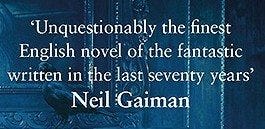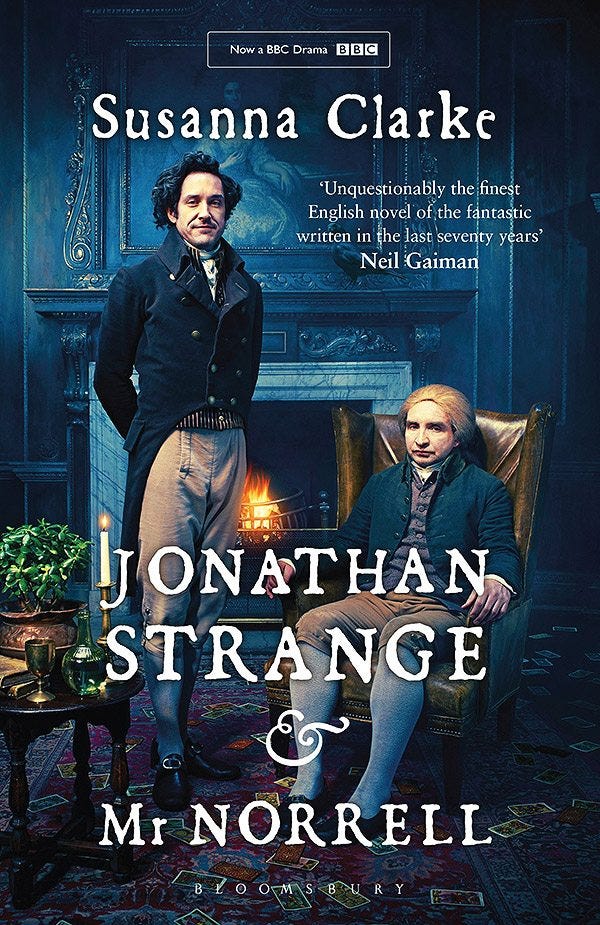All About Blurbs
Have you ever wandered through the aisle of a bookstore, browsing the faced-out titles, when you spot a name on the cover that isn't the author's? Something that might look like this?

This is a "blurb", or what I like to call the author's letter of reference.
In publishing, blurbs are something of a contentious topic, as different people debate whether or not blurbs are even necessary. I will admit that as a consumer, I've only ever once picked up a book because of a blurb, and that was the very book for whom Neil Gaiman gave the above quote:

I will also admit to the fact that Neil Gaiman's blurb isn't the only reason I picked up this novel; I had already read a review of this book in Time magazine, and I remember reading somewhere that it had also won the Hugo and World Fantasy Awards. And I'll wager that most readers don't really notice the laudatory praise on book covers, or if they do, it will only push them over the line from "Undecided" to "Will Certainly Buy."
But for a debut novelist, blurbs can be something of a stressful thing. As an unproven author with no history or sales track behind you, the best way to get the attention of your publisher's sales and marketing force is to come into launch[1. I promise to write a post about the launch process at some point in the future. Based on reader feedback, I will try and elucidate some of the "behind-the-scenes" stuff with posts like I wrote for what it means when an editor takes your book to acquisitions.] with some hefty endorsements. Ideally from writers who have a proven track record, who also write books in a similar vein to yours.
Did you think that putting yourself out there and finding rejection would end once you get a book deal? Oh no, my friends; this party never ends! :) I kid, I kid, but to be honest, be prepared to be pitching you and your book for the rest of your life: to agents, to editors, to authors way higher up the food chain than you, to booksellers, to readers, etc. Once a manuscript begins the process of moving from a story in your head shared with you and your editor to a tangible product, that's when blurbs come in. That's when you and your editor pitch your book to other authors and ask if they would be interested in reading with an eye toward blurbing.
The matter of which authors to approach for blurbs is partially political, partially personal, and partially mercenary. This is where having a community of writer-friends (like PubCrawl!) can be incredibly beneficial; friends who have already published are usually more than willing to put their name behind yours.
This is also where comps can come in useful. If you know that your fantasy novel is similar in tone and scope to another author, then you can pitch said author and ask if they would blurb your book. (Or your editor will do this, if she has the contacts. But everyone is generally pitching in for contacts at this point, including your agent. This is also when asking for blurbs can start to feel a little bit like a popularity contest.)
Do blurbs matter in the long run? I don't think they do, or at least, not on the consumer end. But for a publisher's sales and marketing team, blurbs are a fantastic tool. Sales reps at publishers have a number of accounts into which they sell their titles. Because it's not likely they've read every book coming out that season, they'll see a book with a blurb by X Author and Y Author, and know just how to pitch it. "Oh, this book will appeal to fans of Stephen King and Joe Abercrombie." The bookseller hears this, and then knows where to shelve the book in the bookstore, and to gauge how many copies they should buy for their store, based on their customer metrics.
The ideal blurb should look like this. It should:
Come from an author whose work is similar in tone, scope, style, and genre as yours.
Ideally come from author whose name carries some weight (this is where things can get political).
Be positive! (Duh.)
Sometimes, at the end of the day, you may not end up with any blurbs. And that's okay. Blurbs are mostly just a marketing gimmick, another tool in your arsenal. Not getting a blurb won't kill your book. As I always say, your story is what matters most, and if the story is strong, the readers will find you.
That's it! If you guys have any more questions about blurbs, or any other part of the publishing process, feel free to leave them in the comments!








